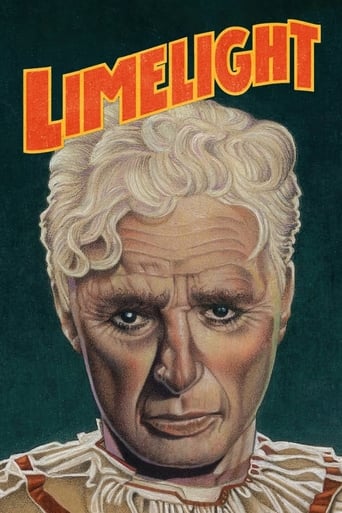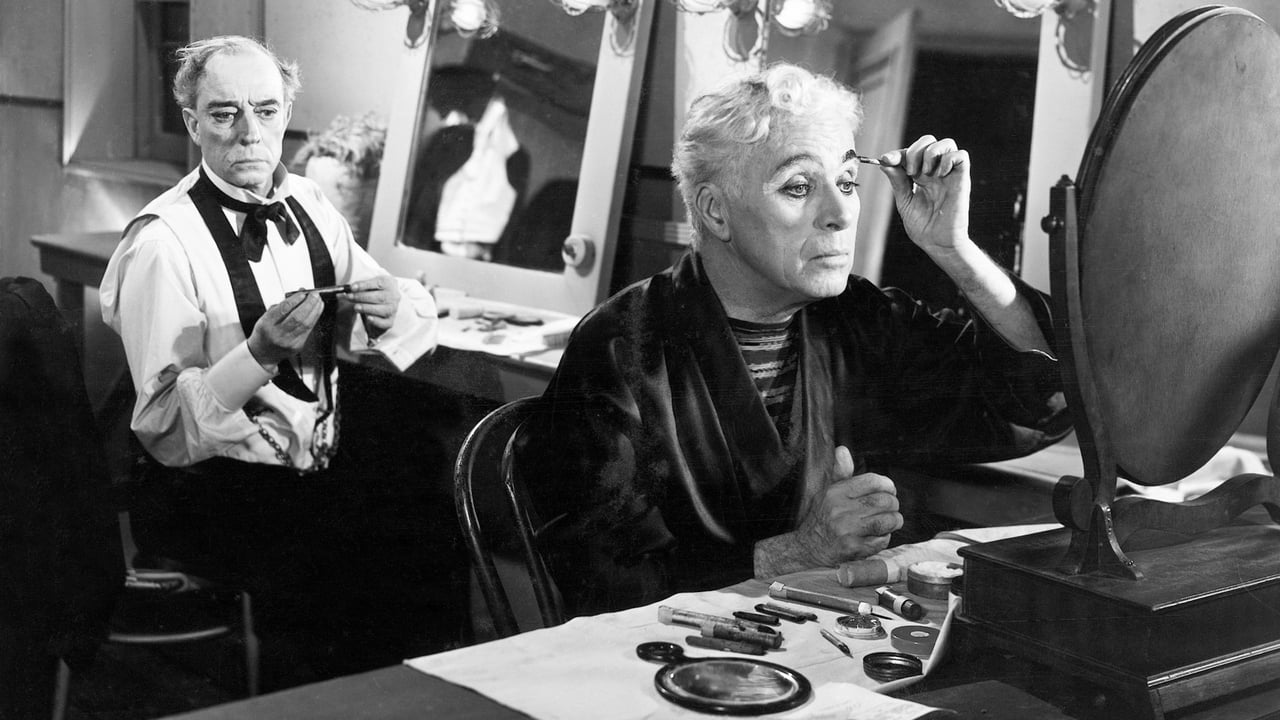gsygsy
Bosley Crowther, the New York Times's movie critic at the time of this movie's release, concluded his review with the words "'Limelight' is a very moving film." To my surprise, I agree with him. Although as it was chugging along, I thought it was often verbose, sluggishly paced, only fitfully amusing, and heavy on philosophising, when its famous theme swelled up in the orchestra for the final scene, I burst into tears. It was evident that Chaplin's tale of age giving way to youth had been quietly working on my feelings. You've got to hand it to the guy: after a lifetime making movies, he knew what he was about.One of LIMELIGHT's most fascinating aspects is Chaplin's take on audiences. We see his hero, the vaudevillian Calvero, play his old act twice: first, in a half-empty, emptying theatre; second, before an enthusiastic packed house. The act, though, is the same: there's no sense of a difference between the way Chaplin/Calvero plays it the first time and the second. The early audience decides it doesn't like it, the later audience decides it does. Such haphazard behaviour would be enough to wear anyone down in any relationship. Chaplin powerfully conveys the emotional cost of being at the receiving end of the public's whims.At the opposite stage of her life is Theresa, a young ballet dancer, whose confidence has left her. Even as the flame of Calvero's own self-respect flickers, he is able to ignite Theresa's. The role was a huge break for Claire Bloom, not an actress for whom I have great admiration, but she does OK here, with youth on her side. Elsewhere, there are such delights as Majorie Bennett, Buster Keaton, and Chaplin's own beautiful score.I don't know whether, when all's said and done, it's a masterpiece or not, and maybe it's helpful to be an old person like me to get the best out of it, but, once seen, it's unforgettable.
willwoodmill
Charlie Chaplin is undeniably one of the greatest and most influential directors of all time. And Limelight is probably his most personal and underrated film. While most of Chaplin's films or a satire of the current political state, (modern times is of course about the Great Depression, and the great dictator is obviously about the Nazi party and WWII). But Limelight is a satire about the entertainment industry and more importantly Chaplin himself. Though Limelight is one of his lesser known films, its influence can definitely be seen in films like, Birdman, and Hail Cesar, and Limelight also perfectly represents what the film industry was going through at time, (similarly to all about eve, and sunset blvd) Hollywood was moving from the old to the new, and the old was being forgotten. Limelight is about a washed-up former alcoholic clown, who rescues a young dancer from attempting suicide, after the incident is over, Calvero (the name of Chaplin's character, the clown) looks after until she is well again. The presence of the young dancer, reinvigorates Calvero, and he tries to restart his career under a fake name, while the dancer climbs to the top. Limelight is very clearly art imitating life. It had been five years since Chaplin made his last film, Monsieur Verdoux, and that film was received poorly in America, (though it did better in Europe), and Chaplin was beginning to be forgotten. He was a relic of the past, of the silent film era. He was turning into another Buster Keaton, who actually makes a short cameo in the film. And limelight perfectly represents his fears and anxieties. Limelight was a massive success at the time grossing over 5 times as much as Monsieur Verdoux, but it slowly faded from the public eye, and is typically forgotten when talking about Charlie Chaplin's greatest films, which is a shame. 8.7/10
Kirpianuscus
Calvero remands me the Chaplin taking the honorary Oscar in 1972. his words. his emotion. his presence as gallery of so many characters. not only for the links between the clown and its interpreter. but for the bitter delicacy who reflects the fight and passion and sacrifices of an entire career. Limelight could be perceived as artificial and prisoner of clichés. the comedy has not the force from another Chaplin's works. the speeches of the artist are more didacticism. but that is the purpose. to open a door who seems a wall. to present love in a different light and angle. to show the artist out of its art-cocoon. the virtue of Limelight is to be a precious naked honest confession. about life not about art. about force of decision. about joy and success and truth. about the other as part from you. the presence of Buster Keaton. the performance of Claire Bloom. the large slices of mannerism. each as piece not for a masterpiece because nothing need demonstrated. but as a precise look in heart of small things who defines each existence. it is not a film for applause or for great eulogies. it is bitter film using almost well known theme. but it has the force to imagine a way to remind the man and not the brilliant actor. Calvero has not exactly a character. it is a fragile confession from a great man about himself and about his vision about the existence.
SnoopyStyle
It's 1914 London. A drunken Calvero (Charles Chaplin) finds Thereza Ambrose (Claire Bloom) passed out in her room from the gas. She had tried to kill herself. The doctor and Calvero take her up to his room where she recuperates. Calvero was once a successful vaudeville clown but now he's all washed up. His agent gets him a show but it goes horribly. Six months later, she has regained her confidence as a ballet dancer. She's in love with Calvero despite his drunkenness. She's reunited with composer Neville (Sydney Earl Chaplin) whom she had a crush on as a shopgirl. Calvero continues to dismiss Thereza's marriage proposals.I find Chaplin too stridden to be either romantic or as a kindly mentor. He's a little off-putting and his comedy isn't working that well. He's more of a physical comedian. When the audience walks out on him, it seems very autobiographical. This works a little better as a drama. Chaplin's son is a bit stiff. That role needs somebody better. The biggest missed opportunity is Chaplin's performances on stage. It seems like a great time to reintroduce the tramp. At this point, Chaplin works better as a man passed his prime and that would be powerful. This movie asks too much from him. It's also fun to see Buster Keaton share the same screen with Chaplin and they have some good scenes together. Imagine if they did their act as older version of their acts.



 AD
AD





